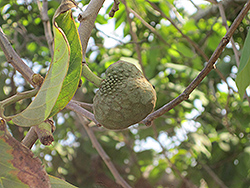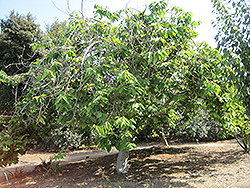It's all about ...
plants

Height: 25 feet
Spread: 10 feet
Sunlight:
![]()
Hardiness Zone: 10b
Other Names: Custard Apple, Chirimoya, Chirimuya
Description:
These trees are generally bushy and low but can be pruned to shape; large oval to elliptical glossy leaves with cone shaped flowers that can appear anywhere on the trunk or branches; fruit is sweet and juicy but seeds are poisonous
Edible Qualities
Cherimoya is a medium-sized tree that is typically grown for its edible qualities. It produces light green oval fruit (technically 'pomes') with creamy white flesh which are usually ready for picking from mid to late summer. The fruits have a sweet taste and a sweet fragrance.
The fruit are most often used in the following ways:
- Fresh Eating
- Eating When Cooked/Prepared
- Baking
- Preserves
Features & Attributes
Cherimoya has attractive dark green foliage with light green undersides on a tree with an upright spreading habit of growth. The glossy oval leaves are highly ornamental and remain dark green throughout the winter. It features unusual chartreuse hooded flowers with yellow eyes along the branches from late winter to early spring. The fruits are showy light green pomes carried in abundance from mid to late summer. The fruit can be messy if allowed to drop on the lawn or walkways, and may require occasional clean-up.
This is an evergreen tree with an upright spreading habit of growth. Its average texture blends into the landscape, but can be balanced by one or two finer or coarser trees or shrubs for an effective composition. This is a relatively low maintenance plant, and should only be pruned after flowering to avoid removing any of the current season's flowers. It has no significant negative characteristics.
Aside from its primary use as an edible, Cherimoya is sutiable for the following landscape applications;
- Accent
- Shade
Planting & Growing
Cherimoya will grow to be about 25 feet tall at maturity, with a spread of 10 feet. It has a low canopy with a typical clearance of 2 feet from the ground, and is suitable for planting under power lines. It grows at a medium rate, and under ideal conditions can be expected to live for 40 years or more.
This plant is typically grown in a designated edibles garden. It should only be grown in full sunlight. It prefers to grow in average to moist conditions, and shouldn't be allowed to dry out. It is not particular as to soil type or pH. It is somewhat tolerant of urban pollution. This species is not originally from North America.
This plant is not reliably hardy in our region, and certain restrictions may apply; contact the store for more information.

